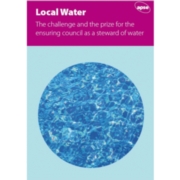Local water stewardship offers environmental and economic benefits, says APSE report
A new report has been published by the Association for Public Service Excellence (APSE), which demonstrates how councils can be effective local water stewards.
APSE's chief executive, Paul O'Brien, said: 'The ability to manage flooding and other extreme weather crises is increasingly important as experts believe these will become more frequent in future. It is therefore vital to ensure councils are able to plan for water related events, respond to emergencies and manage and maintain infrastructure in a way that minimises risk and maximises benefits. Effective water stewardship is a way in which councils can properly co-ordinate their strategic responsibility for environmental sustainability, their day to day delivery of environmental services and their emergency planning remit.'
The report, ‘Local Water: The challenge and the prize for the ensuring council as a steward of water’, shows how APSE's 'ensuring council' model can help join up local government's responses to water issues affecting their locality. The ensuring council, which has been developed as part of APSE's research partnership with De Montfort University, offers a positive future vision for local government. 'Stewardship' and 'maintenance of core capacity to provide services' are among the guiding principles of the ensuring ethos.
The report's author, Philip Monaghan of think-tank Infrangilis, said: 'Rather than looking at flooding in isolation, this publication demonstrates how responses to extreme weather can be considered alongside local government's role in ensuring the security of water supply and use. Maintaining core capacity to deliver services, rather than being caught up in contractual arrangements, can link councils' strategic and operational responsibilities and ensure flexibility in responding to severe weather. There is also a financial argument for local water stewardship – with every £1 spent on flood defence saving £8 dealing with damage from extreme weather, not to mention potential local economic benefits from sustainable water technology.'
The publication includes case studies showing effective local water stewardship in practice. These include:
- Belfast City Council’s multi-agency flood resilience forum.
- Cheshire East Council’s strategic approach to flood risk assessment.
- Derby City Council’s hydro-electric power plant.
- Glasgow City Council’s measures to conserve, recover and reuse water.
- East Riding of Yorkshire Council’s waterways partnership for sustainable water.
- Eastleigh Borough Council’s education campaign with Southern Water.
- Liverpool City Council’s development of a marine and rivers technology cluster.
- North Tyneside Council’s water cycle strategy.
- Oxfordshire County Council’s flood forum.
- Stockton-on-Tees Borough Council's response to a huge tidal surge.
The report suggests ways in local authorities can maximise their water stewardship role, based on discussions with APSE members. These include:
- Establish a pan-council project group to oversee an integrated water management framework.
- Collaborate with other authorities and organisations and identify opportunities for shared services.
- Prepare a water cycle baseline to give clarity on local challenges and prizes.
- Consider how assets such as parks and other public spaces can be water stores during flooding.
- Maximise multiplier effects of money spent on sandbags, water butts, flood gates and SUDs.
- Engage residents in water conservation measures.
- Use regular performance reports to monitor progress on water stewardship.
It also makes recommendations to national government for overcoming barriers to local water stewardship. These include:
- Refresh the National Infrastructure Plan with a long-term vision for a UK water asset framework.
- Redefine Grant in Aid criteria to recognise the relationship between water and low-carbon infrastructure development.
- Ring-fence budgets and staff involved in flood or drought defence in organisational restructuring.
- Revise planning policy so new buildings in water sensitive zones must be flood and drought resilient.
- Request that regulators on water issues strengthen accountability to local councillors and citizens.
- Ensure councils play a key part in the UK’s new vision for water technology exports.
For further information
For more information contact, Mo Baines, head of communication and co-ordination at APSE. Tel: 0161 772 1810. Email: [email protected]
Notes for editors
The Association for Public Service Excellence (APSE) is not-for-profit local government body working with some 300 local authorities across the UK promoting excellence in public services.
Infrangilis works with the public sector, businesses, NGOs and academia to instigate or accelerate innovative solutions on the interface between the green economy and sustainable urban development.
The 'ensuring council' has been developed as part of APSE's research partnership with De Montfort University. The publication The Road to 2020: A Manifesto for the Ensuring Council outlines the vision and ethos for the ensuring council and other reports have discussed what the ensuring council means in practice in relation to a range of local government services and challenges facing the sector. See:
This latest publication is part of APSE’s ongoing research on the role of the ensuring council in the green economy. It builds upon earlier guidance, which includes 'Addressing responsibilities under the under the Flood and Water Management Act 2010' and 'Stronger Resource Efficiency for Desirable Communities'.


.png)



.png)